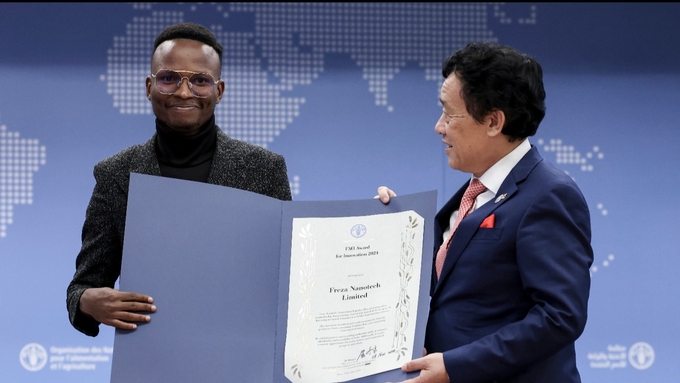December 5, 2025 | 22:02 GMT +7
December 5, 2025 | 22:02 GMT +7
Hotline: 0913.378.918
December 5, 2025 | 22:02 GMT +7
Hotline: 0913.378.918

FAO Director-General QU Dongyu presents the FAO Innovation Award to Mugisha Gift Arnold of Freza Nanotech Limited.
Freza Nanotech Limited, a startup from Uganda, has won the 2024 Food and Agriculture Organization of the United Nations (FAO) Innovation Award for developing a groundbreaking nanotechnology-based solution that extends the shelf life of fruits and reduces postharvest losses. The award ceremony took place today at FAO’s headquarters in Rome, on the sidelines of the 176th Session of the FAO Council.
Freza Nanotech’s innovative technology uses an organic formulation to inhibit the activity of phospholipase D, an enzyme involved in fruit ripening, extending fruit shelf life by up to 30 days. This emission-free solution addresses a critical challenge in the food supply chain, reducing waste and increasing the availability of fresh produce for consumers. By benefiting both farmers and consumers, the technology has the potential to make a significant impact on food security, economic development, and environmental sustainability.
“Their efforts demonstrate that agrifood systems can be both productive and sustainable, contributing to better nutrition and improved livelihoods in Uganda and beyond,” said FAO Director-General QU Dongyu during the award ceremony. “Showcasing best practices and innovative solutions like those of Freza Nanotech is important because of their positive impact on production, nutrition, environment and livelihoods, and their contribution to the Four Betters: better production, better nutrition, a better environment and a better life – leaving no one behind,” he added.
The company’s technology has been particularly transformative for smallholder farmers in Uganda, enabling them to reduce postharvest losses, improve their yields, and stabilize fruit prices. Consumers benefit from the increased availability of fresh produce at more affordable prices, while the environment benefits from reduced food waste and lower emissions associated with food spoilage.
Mugisha Gift Arnold, Chief Operating Officer and Co-Founder at Freza Nanotech, emphasized that receiving the award not only recognizes the team's commitment but also symbolizes how innovative technological solutions can have a significant impact on global challenges, particularly in food security and sustainability. He highlighted how the technology developed by his company is contributing to improving food availability and supporting economic growth, making a tangible difference in people's everyday lives.
The FAO Innovation Award is part of the FAO Awards Programme, which honors organizations, individuals, and institutions whose innovations contribute to the transformation of agrifood systems and the achievement of the Sustainable Development Goals (SDGs). The ceremony today at the FAO Council underscores the role of innovation in addressing global challenges and driving sustainable development in agriculture worldwide.
(FAO)

(VAN) Landmark SOLAW 2025 report reminds us that resources for food are not infinite.

(VAN) Climate change is a growing concern for agricultural productivity and several studies have focused on how climate variations can impact crop yields.

(VAN) In today's fast-paced society, with people busy with their work and social lives, many dream about quitting the rat race to experience a slower pace of life, which they imagine as being more poetic.

(VAN) Mindanao’s durian industry is reaping the benefits of rising global demand, with farmers now enjoying improved market access, better farmgate prices, and stronger profitability, the Department of Agriculture in Davao Region (DA-11) reported.

(VAN) Iraq is currently grappling with one of the most severe agricultural and livestock crises in its modern history.

(VAN) The Mediterranean and the Black Sea: Fisheries sustainability concerns remain, but overfishing drops to its lowest level in a decade, while aquaculture feeds more people.

(VAN) Cargill Inc has no plans to close its U.S. beef processing plants, days after meatpacker Tyson Foods l opens new tab announced it would shutter a Nebraska facility as industry grapples with cattle supplies.